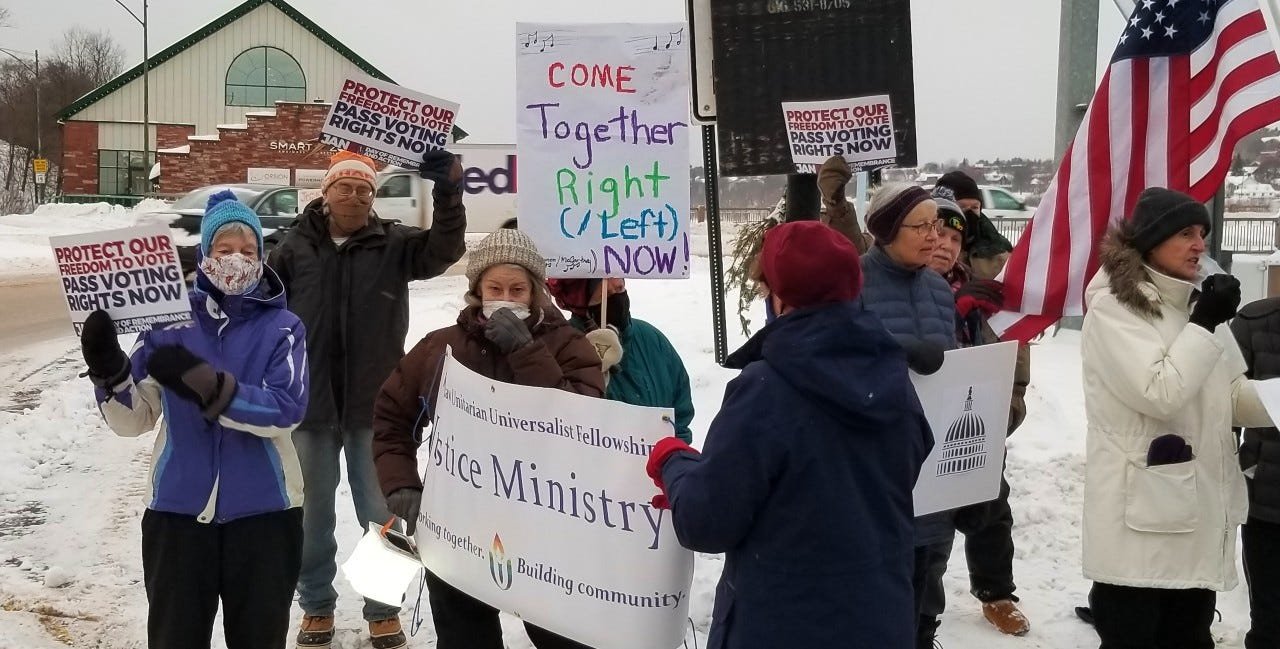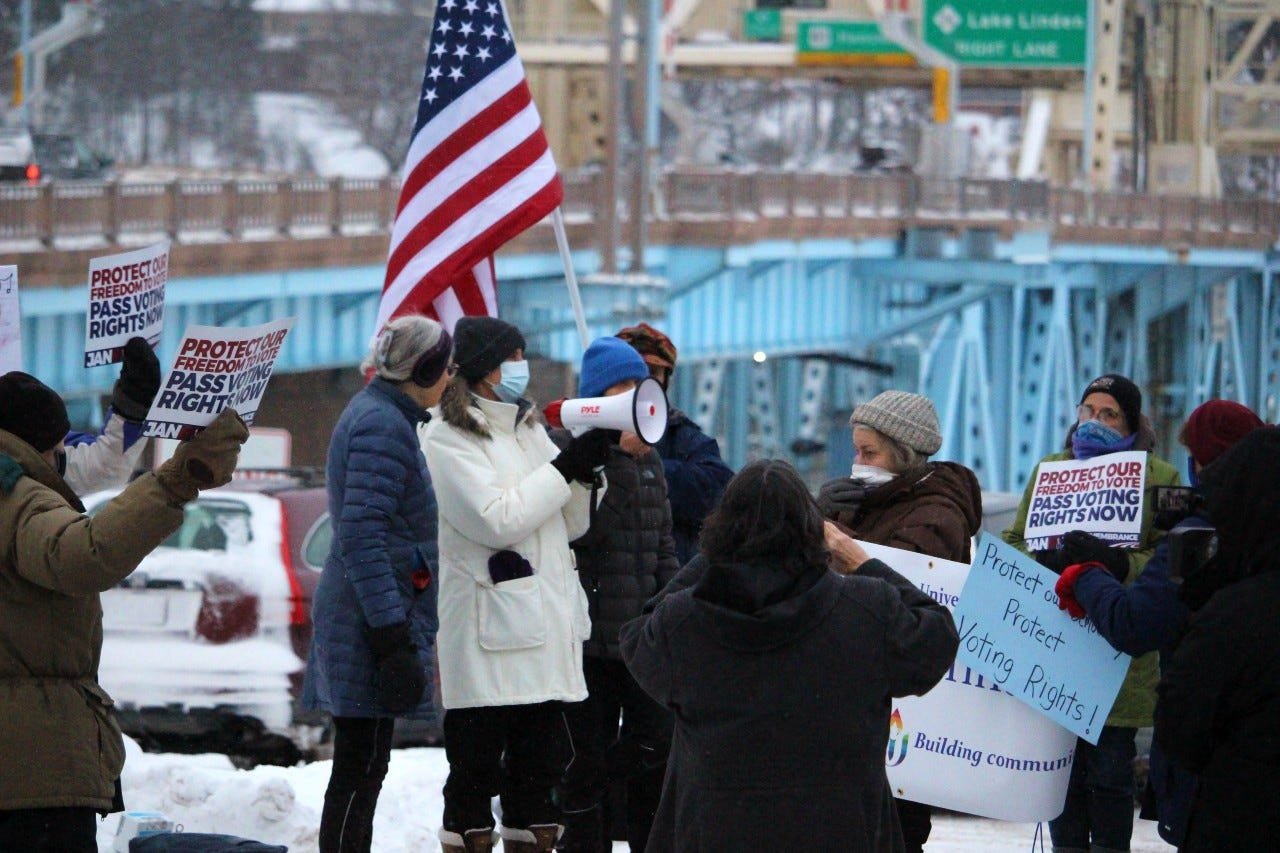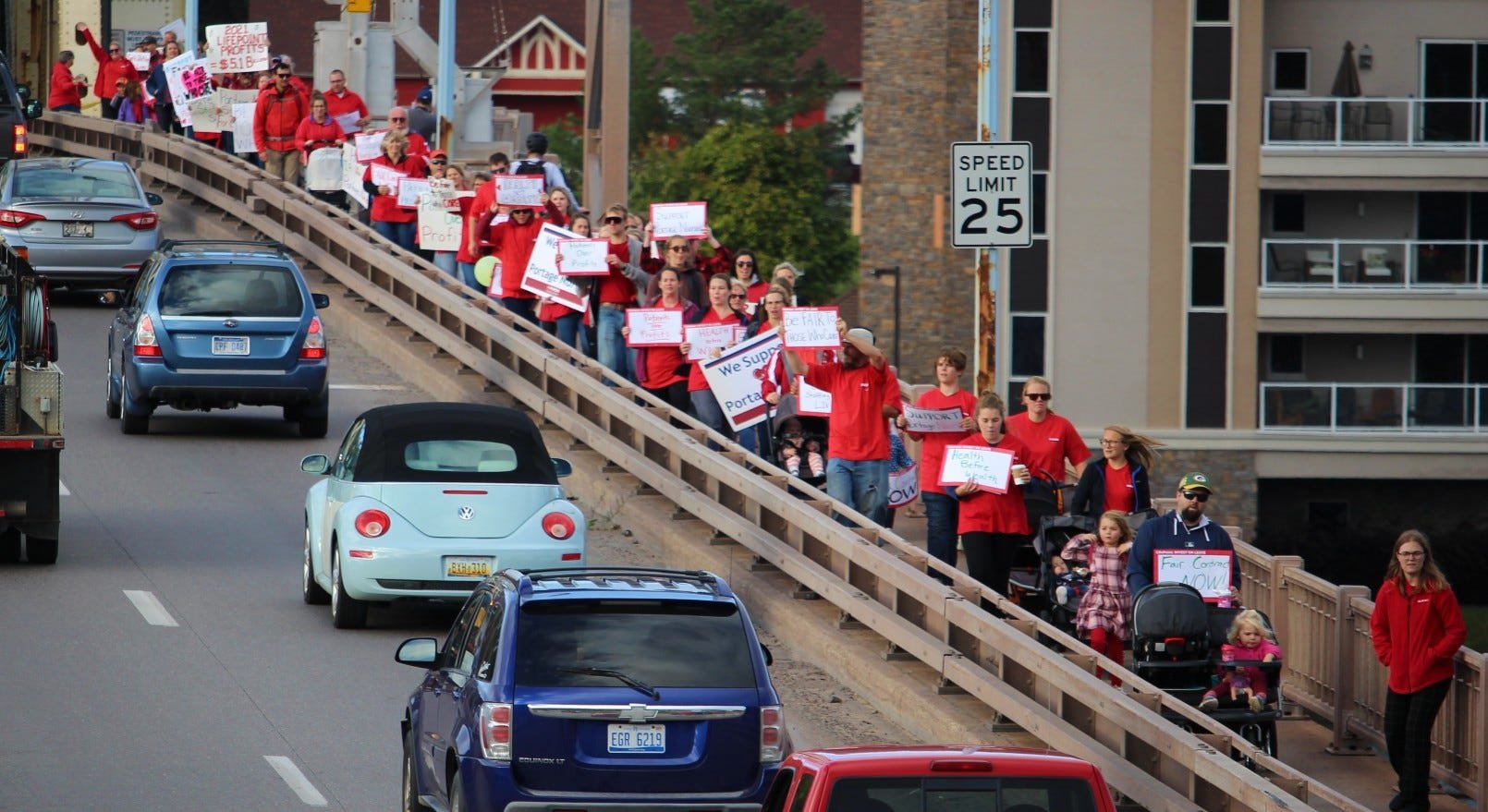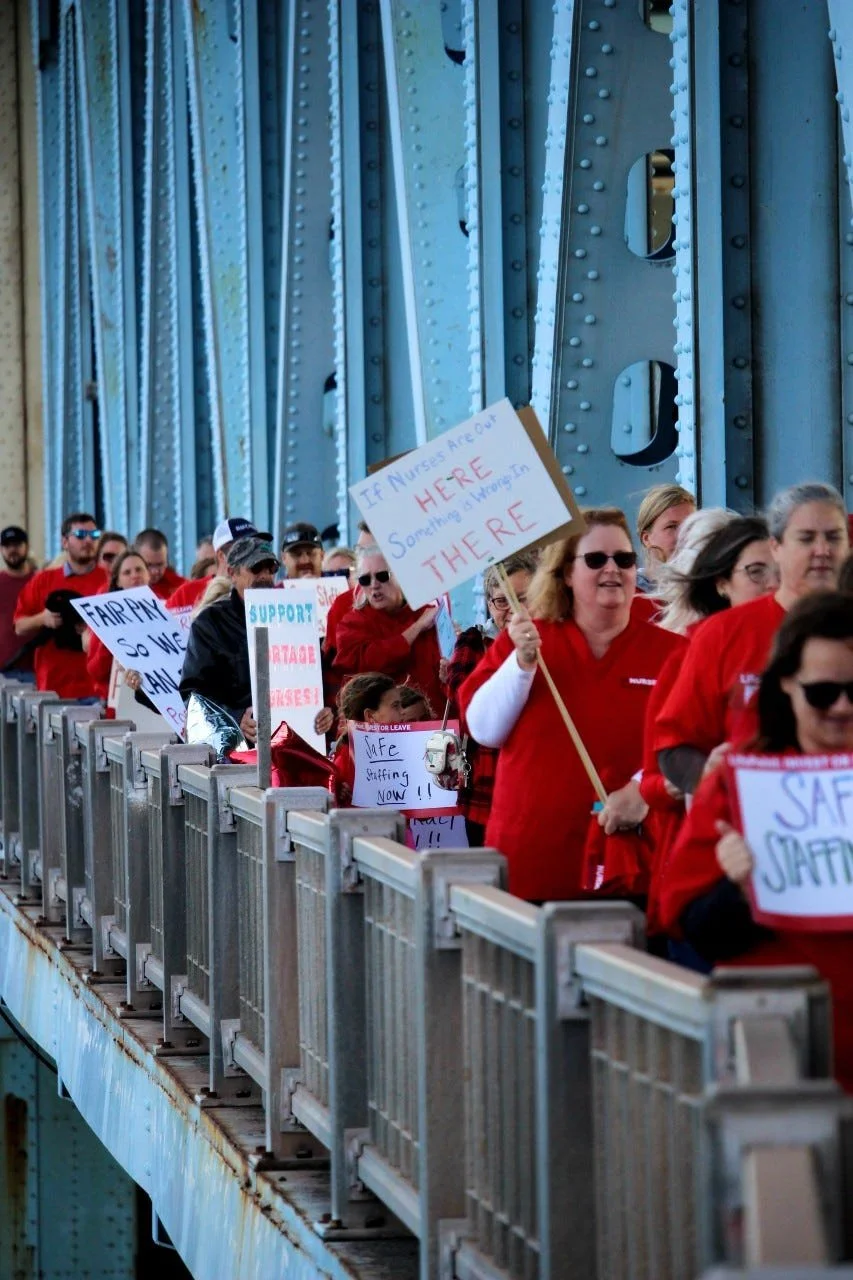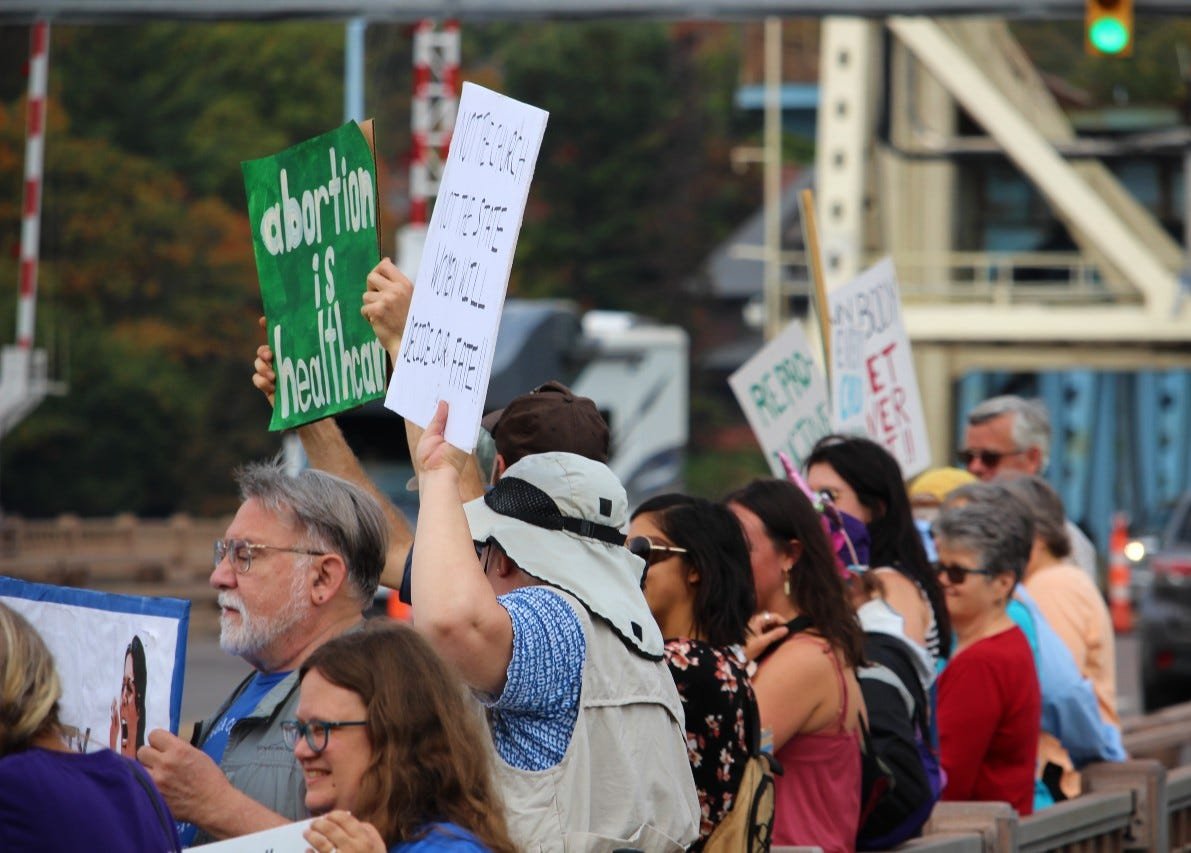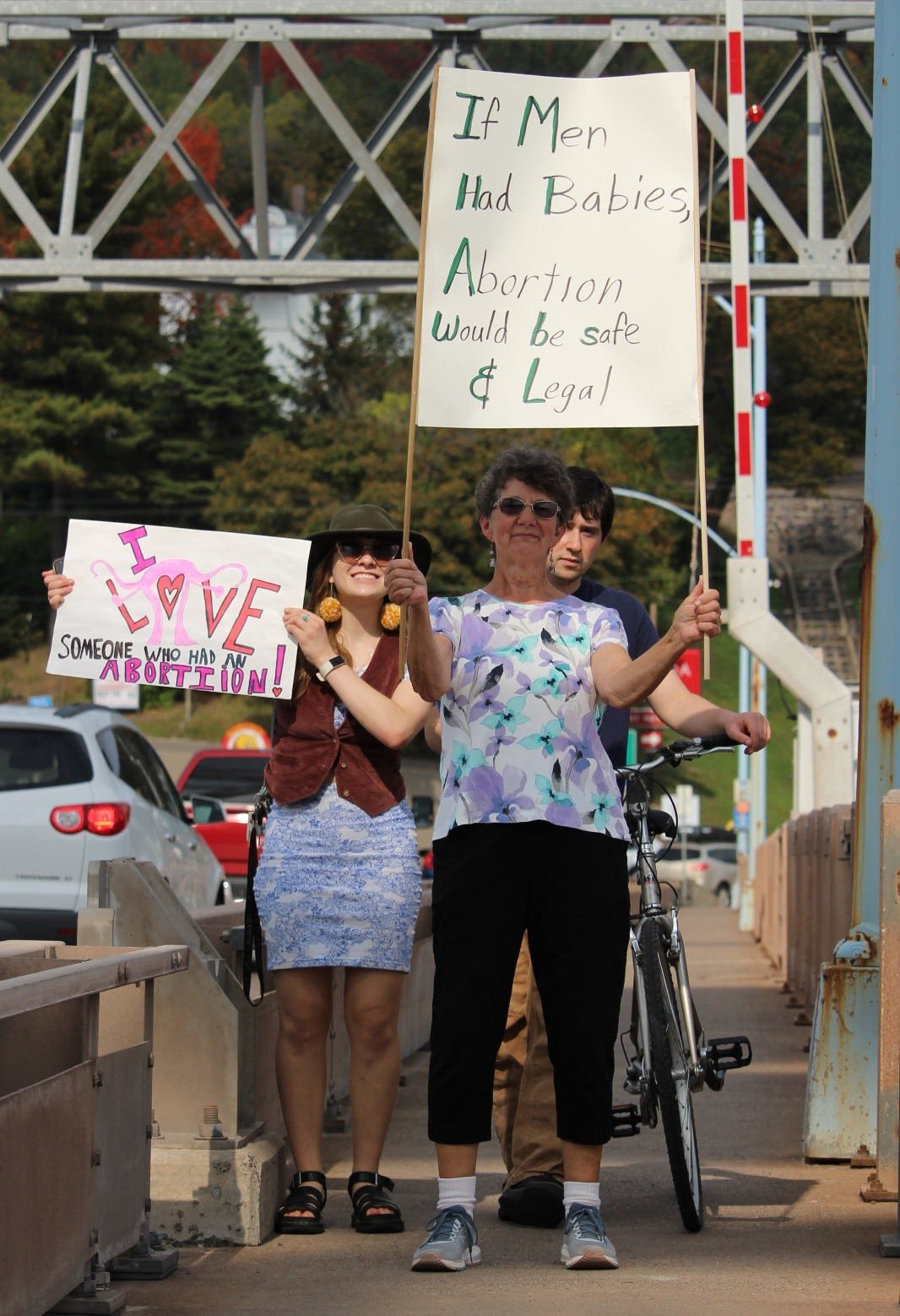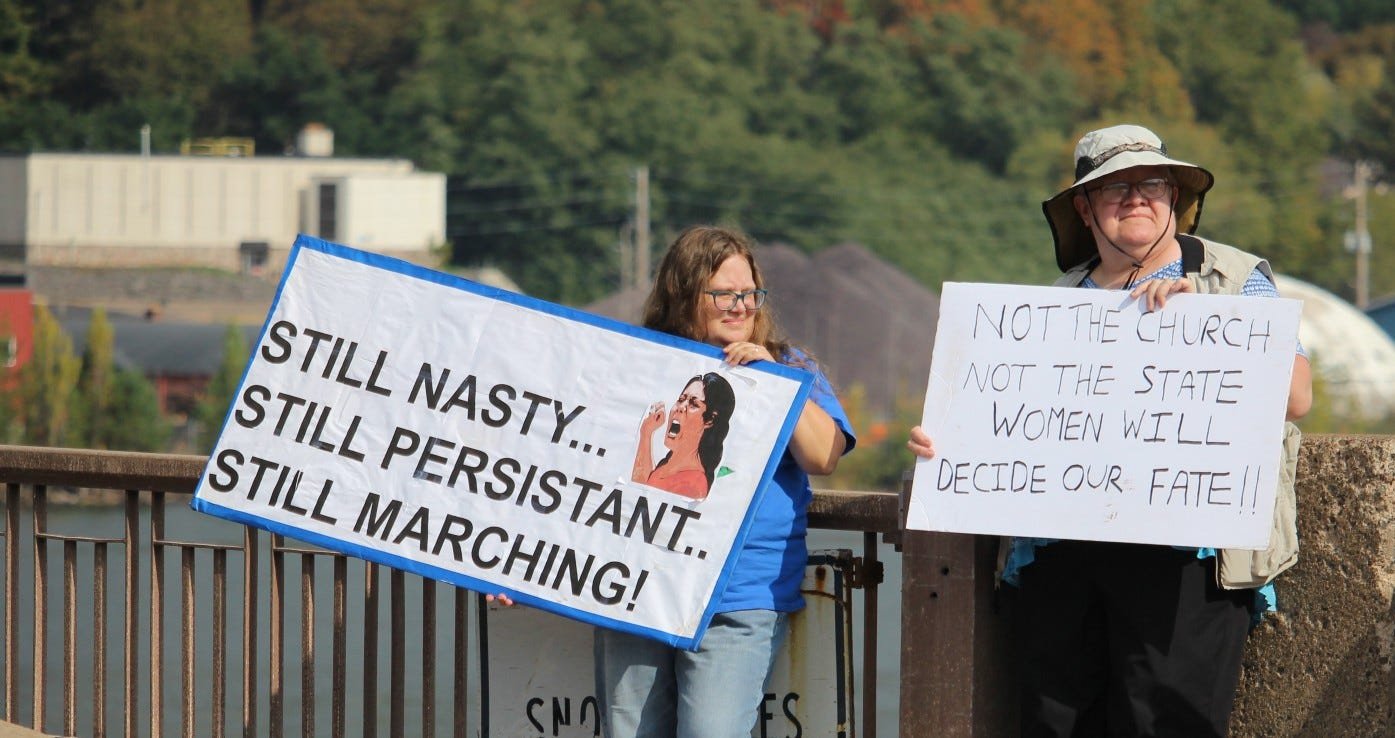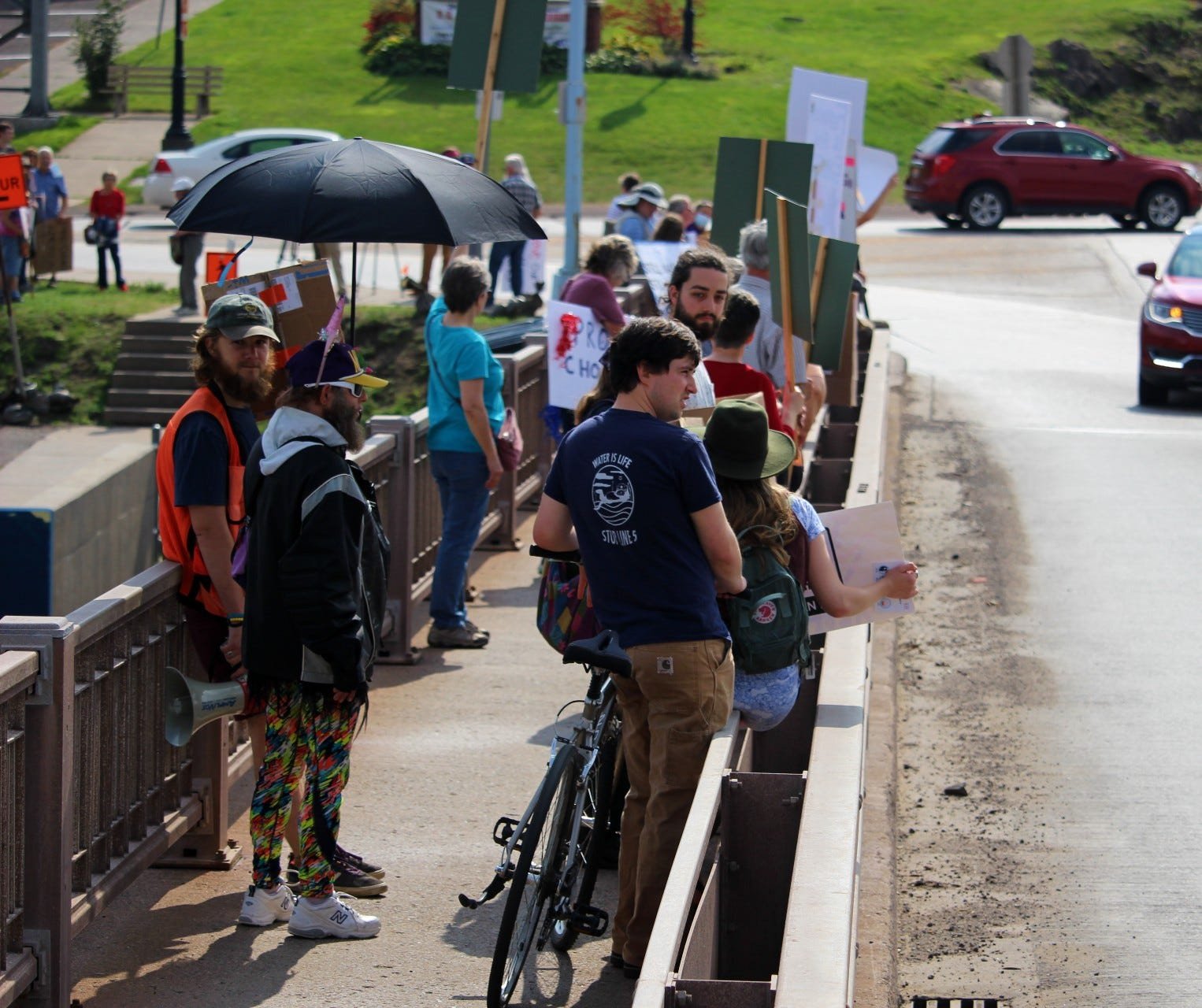Women Get Less: the gender pay gap
Women have always been paid less than men, and the gender pay gap continues to be a prominent issue today. When comparing full-time, year-round workers in 2021, women would have needed to work an extra 49.5 days to make up for the pay gap.
Women have always been paid less than men, and the gender pay gap continues to be a prominent issue today. When comparing full-time, year-round workers in 2021, women would have needed to work an extra 49.5 days (using a typical 40-hour work week) to make up for the pay gap, with women taking home 84 cents per 1 dollar of what men were paid. Equal Pay Day is held every year on the day when women would have finally closed the pay gap from the male pay from the previous year. This year, it was held on March 14, 74 days after Dec. 31. The local chapter of the League of Women Voters brought attention to this issue armed with informational brochures handed out at Michigan Tech on March 14. .
Faith Morrison is a member of the local chapter of the League of Women Voters who taught chemical engineering at Michigan Tech for 32 years before retiring. She acknowledges that it’s true that there are pay differences between occupations that are monopolized by one gender, using the example that engineers make more money than many other fields of work.
Faith Morrison on Michigan Technological University’s campus on March 14. Photo by Sidney Wilmot.
She said, “because there are more male engineers than female engineers than let’s say nurses, there are more female nurses than male nurses, you could expect that would cause a pay gap.”
However, according to author Cathrine Hill, once relevant factors (college major, occupation, economic sector, age, marital status, etc.) have been considered, the pay gap was still 7% just one year after graduating from college and widened to 12% ten years after graduating. The League of Women Voters calculated that if a man makes $100,000, the woman then makes $93,000. Assuming both parties receive a 2.5% yearly raise, the man saves the “pay gap” money, and earns a 5% interest, in 25 years he’s over $400,000 ahead of the woman.
“Even within a discipline we don’t want to see a gap in pay between men and women, because we don’t think that comes from any merit. We think that many women, on average, [in] the same discipline and same background, should make the same,” Morrison said.
So why does this still happen? Morrison highlighted a book by Virginia Valian, called “Why So Slow?: The Advancement of Women,” which talks of nonconscious bias. The book included results of experiments and examples of integrated stereotypes and assumptions in our minds and society that apply to gender differences. An example from the book Morrison cited was where an identical resume was submitted for review, but changed the obviously male name to a female name. The resume with the female name got a lower ranking than the one with the male name. Morrison explained that this experiment has been done with names that denote racial differences, which also ended up considered a lower ranking.
To fight against this inequality, Morrison says that “what we’re doing here is to educate [people] about [nonconscious bias]. Let people know this happens… if you can spot it happening, ask yourself ‘well why did I think that’…if you can catch yourself, you can make a change… we’re not trying to break anything, we’re trying to make something better.”
She continued to explain that it was often thought that women’s income were simply supplemental to the household income, and not a necessity. The societal role and pressure on women to attend the house and raise children meant that their jobs were done in their free time, and they were financially dependent on men.
“When I started here at Michigan Tech, I was the first woman they ever hired in the Department of Chemical Engineering. … My husband joined the faculty at the same time,” Morrison said. “We had the experience where he had a higher raise than I did. Frankly, there was a good argument to me that it should’ve gone the other way. We confronted the department chair, and he admitted that he had done that on purpose because he didn’t want my husband to feel bad that his wife was going to get a higher salary than he was.”
Morrison’s husband supported her, wondering why he wouldn’t want his household income to be higher.
Morrison also recalls how she went to a program in Washington, DC for the advancement of women in chemical sciences in the early 90s. She remembers a presentation by an MIT professor of biochemistry, Nancy Hopkins, in which Hopkins felt ashamed that she was the target of gender bias.
Morrison agreed that she shared that shame about being the target of gender bias in her successful career.
She said, “It feels terrible, to have to say that you feel someone is discriminating against you, even though it's true.”
When encompassing all workers such as seasonal or part-time, however, the pay gap increased. Women were taking home only 77 cents per 1 dollar made by their male counterpart, meaning they would need to work a shocking 77.6 more days per year (also using a typical 40-hour work week) to make up for the pay gap. The pay gap is increased even further for women of color.
There are sources to fight to close the pay gap. This includes supporting state laws that prevent pay discrimination, advocating for your colleagues and employees, and supporting the Paycheck Fairness Act. If you want more information, visit the American Association of University Women, here.
Group forms for vigil despite cold Jan. 6 weather
Local organizations promote the importance of voters' rights, fair elections
About 50 people came together to remember the Jan. 6 attack on the capitol Thursday at 5 p.m. Photo by Allan Baker
Coinciding with gatherings across the country, around 50 people came together near the south end of the Portage Lake Lift Bridge to recognize the seriousness of the attack in Washington, D.C. on Jan. 6, 2021.
Speakers encouraged attendees to contact their representatives to encourage passage of voting rights legislation, especially at the national level with the John Lewis Voting Rights Act. Organizers said that the vigil was bipartisan and that voter’s rights should not be a partisan issue. Speakers reminded attendees that Republican presidents had renewed the original Voting Rights Act of 1965 for decades until recent court cases weakened it. The new voting rights act would renew old rules and more.
The vigil was sponsored and organized by the Justice Ministry of the Unitarian Universalist Church with strong support from the League of Women Voters. Photo by Joshua Vissers
Mary Marchaterre and Kristine Bradof, both leaders in the League of Women Voters of Copper Country, said their attendance at the vigil had everything to do with protecting the American system of voting, not with any politicians or party.
Marchaterre said joining an active organization like the LWVCC is one way to amplify your voice and help keep American democracy strong. While non-profit and by extension non-partisan, the LWVCC keeps several public positions on things from fluoridation in water to the construction of a new Houghton County Jail. They meet regularly and actively promote their goals.
Most of the signs at the vigil focused on the importance of voting and voting rights. Photo by Joshua Vissers
Bradof said she felt politicians being beholden to their political party, be it Republican or Democrat, is stifling debate and compromise.
“I actually think the political parties are ruining our country,” she said.
Growing up in the Chicago area, she saw good and bad politicians in both parties.
“So I was looking for who is the person who’s running who represents my views and looks at things fairly,” Bradof said. “Instead of just following whatever the party line happened to be.”
LWVCC President Barry Fink addresses those gathered for the vigil. Photo by Joshua Vissers
“In America, the voters decide the outcome of elections,” said Barry Fink, LWVCC president, during her remarks. “The promise of democracy is not a partisan issue but a calling that unites us as Americans.”
She decried misinformation promoted by people in danger of losing power that said the election was unfair or rigged, highlighting the many investigations and court cases that found far too little evidence to support such a conclusion.
“The participants [in the Jan. 6 insurrection] were urged to take action, to ignore the evidence that supported the fairness of the elections, and to believe instead the deluge of mis- and disinformation that the election was not fair,” she said.
She expressed disappointment in the failure of Michigan politicians to validate the duly elected officials from the 2020 election both on Jan. 6 and since then.
“The events in Congress and many state legislatures across the nation since January 6 have sadly shown that a large fraction of politicians sees opportunity in tampering with election laws for partisan gain,” Fink said.
The vigil included a moment of silence for the police officers and National Guard members who were called to protect the Capitol on Jan. 6, some of whom lost their lives as a result.
After the vigil, Fink said that Americans have been imagining that the electoral process was somehow sacrosanct, secure, and self-sustaining.
“And in fact, its vulnerabilities have been exposed,” Fink said. “And we need to be mindful that there are factions that actually want to dismantle the way we conduct elections and that means the demise of democracy.”
She said moving beyond the hyper-partisanship that is damaging our country is going to require people to want to run the nation as a collaborative effort, and not be all about who is holding on to power.
Valorie Troesch makes her remarks to the gathered people. Photo by Joshua Vissers
Valorie Troesch, a member of LWVCC, Houghton County Democrats, Voters Not Politicians, and a former candidate for Houghton County Commissioner, also spoke at the vigil. No current county commissioners spoke or made their presence at the event public.
After the vigil, Troesch said the insurrection is the first time in history the loser of a presidential election has tried to overturn the results of that election.
“That’s never happened,” she said. “And we should never forget that because there are people that are still trying to… pass laws that not only suppress voter rights but also will make it easier to overturn future elections.”
Troesch said there would be a lot of opportunities in 2022 for people to work with organizations like LWV and Voters Not Politicians to get involved in keeping American elections fair and open.
Photo by Allan Baker
Nurses draw a red line
UP Health System-Portage nurses rally to draw attention to staffing and retention issues
Around 90 people walked the Portage Lake Lift Bridge with signs and chanting to support nurses in their contract negotiations with UPHS-Portage on Thursday afternoon.
Kendra Benson, right, preparing for the march.
Kendra Benson has been a nurse at UP Health System-Portage for four years. She’s also worked with Upper Great Lakes and for a year in Detroit. She participated in the rally and interviewed with several media outlets.
“What we want is a fair contract,” Benson said. “We’ve been in negotiations now for going on six months, and they’ve pushed back our contract three separate times.”
She said that the meetings aren’t accomplishing much more than scheduling more meetings, and so now the nurses are putting public pressure on the hospital system to bargain in better faith. Benson said they’re pushing for safe staffing levels and a better recruitment and retention plan.
“So, in order to recruit and retain we need a wage scale that is competitive with our local hospitals,” Benson said. “Which, up here, we’re the lowest-paid nurses in the area, that’s including Marquette.”
Benson said some of the nurses are being mandated to work 18-hour shifts, and that the hospital is hiring part-time staff to work long hours similar to a full-time nurse, but without benefits.
“We want to feel appreciated and we feel, you know, even after all this pandemic and whatnot, we don’t feel appreciated,” Benson said.
Danielle Hamlin, in the red and black plaid, walking to the lift bridge from Bridgeview Park.
Danielle Hamlin has been nursing at UPHS-Portage for 21 years and has been part of several contract negotiations in the past.
“Three years ago they cried poverty and we did not get a raise…” Hamlin said. “Now we’re just trying to be competitive with the hospitals all around.”
Hamlin said the wages at UPHS-Portage are lagging behind other local hospitals by as much as $1.70 an hour. For an employee working 40 hours per week, that calculates out to about $3,500 per year.
She said after the staff cuts during the COVID-19 pandemic, the hospital hasn’t been restaffed to meet the needs of fully reopening.
“We like two dayshift nurses, two nightshift nurses, and a swing shift and we’re way beyond—the ED (emergency department) is not at all at that,” Hamlin said. “We have eight nurses I believe, right now, and we’re supposed to be staffed with 15.”
She said that the lack of staff has kept those nurses remaining at the hospital busier than ever before. When other departments are full, which Hamlin said the intensive care unit currently is, patients have been shifted into the emergency department instead.
“It’s not the proper care,” Hamlin said.
She said the nurses have also requested that security be posted in the emergency room due to an increase in violent incidents with patients, but the hospital has yet to have anyone posted there.
“Some of the staff left because of not feeling safe,” Hamlin said.
Hamlin said the hospital wants to offer signing bonuses for new employees but hasn’t agreed to what they feel is necessary for staff retention.
“So right away, those people are making more than us,” she said.
Hamlin said she felt sad because she used to love her job, but it has become difficult to keep going in for long shifts, with few coworkers, and low pay.
The Michigan Nurses Association, which represents unionized nurses in Michigan, also supports the Safe Patient Care Act, of which Upper Peninsula Senator Ed McBroom is a cosponsor.
The bill sets patient-to-nurse ratios for different departments. An intensive or critical care unit would have to be staffed 1-to-1, all the way down to rehabilitation care, which can be staffed 1-to-5 under the bill. It also limits the amount of overtime a hospital can ask a nurse to work in its effort to meet those staffing goals.
There are currently no patient-to-nurse ratios mandated by law in Michigan.
Problems for hospital departments like understaffing, unsafe working conditions, and stagnant wages are a problem nationwide, with reports from USA Today, Yahoo Finance, Financial Times, Reuters, and numerous local outlets around the country running articles and editorials about it over the last month.
Some hospitals have even had to halt pediatric and trauma admissions or call in the National Guard to maintain staff.
UPHS-Portage is operated by LifePoint Health, a privately held company. Their most recent SEC filings available are from 2018. In the most recent annual filing, they claim $6.2 billion in revenue in 2017 and $102 million in net income (page 50). Macroaxis, an online investment analysis tool, projects their 2021 net income to be $143 million and revenue at $4.86 billion.
UPHS - Portage administration declined to be interviewed for this story, but did provide Copper Beacon with a written statement:
The employees represented by the Michigan Nurses Association (MNA) are critical members of our team, and we support them and respect their right to assemble and speak freely to the community they serve. We understand that the hospital’s contract negotiations with the MNA will likely be addressed. While we cannot comment on specific elements of those negotiations out of respect for the bargaining process, we are confident that the result will be a mutually agreeable contract for all. In the meantime, please rest assured that we will not be distracted from providing excellent care to our patients and community.
UP Health System – Portage takes very seriously our commitment to delivering high-quality, safe, and compassionate care close to home, and we strive daily to create excellent workplaces for our employees. Especially during this pandemic, which has arguably been the most challenging situation the healthcare industry has ever faced, we want to recognize and support our staff and clinical teams who have cared for our patients during this time.
Many cars honked in support of the protestors. Several people waved or shouted. One dog barked repeatedly out of the window of a passing SUV.
People of the Heart walk for the water a 3rd time
Plus meet one of Copper Beacon's new board members!
I took the opportunity this week to highlight an upcoming event while also introducing you all to one of Copper Beacon’s future board members, Kathy Smith. For those of you that don’t already know, Copper Beacon is the name that we’ve chosen to succeed Late Edition as we relaunch as a nonprofit.
Check out the video, and stay tuned to other coverage for more Copper Beacon updates!
Perfect night, great ride
Bikers ride against domestic violence in support of local women's shelter for the eighth year in a row
Mary Niemela (left, seated) with riders and other supporters of the local women’s shelter in their work against domestic violence.
Mary Niemela, the executive director of the Barbara Kettle Gundlach Shelter Home, said October is Domestic Violence Awareness Month, and they usually plan an awareness event on the national day of unity.
“We used to have candlelight vigils, and now we’ve upped it and decided to make some noise,” Niemela said.
This was the eighth annual Ride Against Domestic Violence event in the Keweenaw area. Starting from a brief ceremony at the AmericInn in Calumet, the 29 bikes (and at least as many riders) traveled through Hancock and across the Portage Lake Lift Bridge, led by Sheriff Joshua Saaranen in a Houghton County Sheriff patrol vehicle, although he does have a Harley.
“Next year I’m going to get it all cleaned up and hopefully jump in the ride myself,” he said.
Saaranen said the local women’s shelter is a great resource for the community and a partner with law enforcement. The event is a chance to show public support for the work that they do each day.
“It gives everybody a chance to come out and support the shelter,” he said. “This is my first time leading the parade of course, but I’ve worked with the shelter for many years now.”
The riders looped through Houghton, before heading to Ray Kestner Waterfront Park.
Police held traffic briefly so the motorcycles could pass quickly and safely through the Yooper Loop.
Riders could claim an “Against Domestic Violence” patch for their participation. Here, Mary Niemela is holding one up to a rider’s new jacket.
As the clouds cleared Monday, it turned into a truly beautiful evening to be outdoors.
Community, students, demonstrate for reproductive freedom
Around 70 marchers crossed the Portage Lake Lift Bridge
Catherine Paavola grew up in Detroit and shared, “If abortion had been legal in ‘68, I would not have, as a teenager, had to travel to Mexico for an abortion. It has been legal for many years. It should remain legal.”
She said abortion is a private, healthcare issue.
She also thanked the others who showed up to the march and for the public’s attention to the issue.
Audrey Gerard, a healthcare organizer with Michigan United, thanked the people who worked together to organize the event. They included the League of Women Voters in Copper Country, Rise UP Keweenaw Chapter, Keweenaw Youth for Climate Action, and Michigan United.
Gabriel Ahrendt, a member of Keweenaw Youth for Climate Action, said the Keweenaw march was just one of the demonstrations happening across the country today, and that he came out to support reproductive rights for his friends impacted directly by abortion laws.
“I have a lot of friends who live in Texas,” Ahrendt said. “… We don’t want that to happen here in Michigan.”



